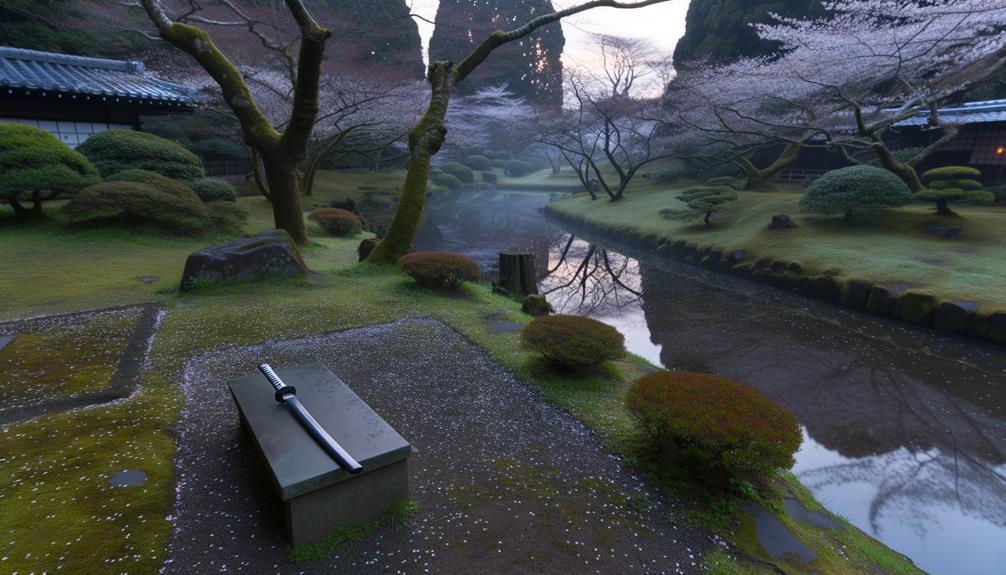Meaning of the Name Katana
The name 'Katana,' derived from Japanese, signifies the iconic samurai sword, emblematic of honor, precision, and mastery. Originating in the Kamakura period, the term is intrinsically linked to the samurai warrior class.
Culturally, it symbolizes discipline, integrity, and a spiritual bond between warrior and blade. Modern usage of 'Katana' as a name reflects its association with strength, elegance, and a unique heritage.
The name's influence in contemporary media underscores its enduring appeal and cultural resonance. As one explores further, the profound historical and symbolic meanings of 'Katana' become increasingly evident.

Key Takeaways
- Katana signifies honor, precision, and mystique, reflecting the qualities of the traditional Japanese sword.
- The name embodies strength, elegance, and a warrior spirit, often associated with samurai virtues.
- Katana represents dedication to craftsmanship and a deep cultural heritage.
- The name suggests themes of bravery, skill, and uniqueness.
- Katana is influenced by its portrayal in media, symbolizing discipline and lethality.
Historical Origins
The name 'Katana' originates from the Japanese language and is historically associated with the traditional Japanese sword, renowned for its distinctive curved, single-edged blade. The katana emerged during the Kamakura period (1185-1333) and quickly became an essential weapon for the samurai class.
Its design was not merely aesthetic but functional, optimized for swift, efficient cutting. The katana's construction involved meticulous forging techniques, resulting in a blade that was both resilient and exceptionally sharp.
Over time, the katana transcended its martial origins to become a symbol of cultural heritage and craftsmanship in Japan. The weapon's prominence in Japanese history is underscored by its frequent depiction in literature, art, and folklore, signifying honor, precision, and the warrior's spirit.
Linguistic Breakdown
Understanding the linguistic breakdown of the name 'Katana' provides further insight into its cultural and historical significance. The term 'Katana' is derived from the Japanese language, where it is written as 刀. The character 刀 (Katana) specifically refers to a single-edged sword, which is emblematic of its distinctive design. The word itself can be broken down into the following components for a richer understanding:
| Japanese Character | Romanization | Meaning |
|---|---|---|
| 刀 | Katana | Sword |
| か | Ka | Part of the word |
| た | Ta | Part of the word |
| な | Na | Part of the word |
| 音読み | Onyomi | Sino-Japanese reading |
This breakdown elucidates the etymological structure and phonetic elements that form the name 'Katana'.
Cultural Significance
The katana, beyond its linguistic roots, holds profound cultural significance as a symbol of honor and discipline within the samurai warrior tradition. This iconic sword not only epitomizes the martial valor and ethical code of the samurai but also continues to influence modern cultural expressions, from popular media to contemporary martial arts practices.
Symbol of Honor
Renowned for its sharpness and craftsmanship, the katana has long been revered as a symbol of honor in Japanese culture. This iconic sword embodies the virtues of respect, integrity, and loyalty, serving as a tangible representation of the wielder's moral and ethical standards. The katana's cultural significance extends beyond its physical form, embodying a profound spiritual connection between the warrior and the blade.
| Symbolic Aspect | Description |
|---|---|
| Sharpness | Represents precision and clarity of purpose |
| Craftsmanship | Reflects dedication to one's art and duty |
| Honor | Embodies the ethical and moral code of the wielder |
| Spiritual Bond | Signifies the unity between the warrior and weapon |
This symbolic resonance has cemented the katana's status as more than a mere weapon, but a revered cultural artifact.
Samurai Warrior Tradition
Integral to the katana's status as a symbol of honor is its deep-rooted connection to the samurai warrior tradition, which imbues the blade with cultural and historical significance. The katana, emerging in the Muromachi period (1336-1573), was not merely a weapon but an extension of the samurai's spirit and ethical code, known as Bushido.
The following elements epitomize the katana's profound integration into the samurai warrior tradition:
- Ritualistic Craftsmanship: Each katana was meticulously forged, reflecting the spiritual dedication and technical skill of the swordsmith.
- Symbol of Social Status: Wielded by samurai, the katana denoted a distinct social hierarchy and the warrior's esteemed position.
- Embodiment of Bushido: The katana represented the virtues of loyalty, courage, and honor fundamental to the samurai ethos.
This deep connection underscores the katana's enduring cultural relevance.
Modern Cultural Impact
Modern media's portrayal of the katana has cemented its status as an iconic symbol, transcending its historical roots to influence contemporary popular culture globally.
Films, television series, and video games frequently showcase the katana, often associating it with themes of honor, precision, and mystique. This weapon, emblematic of the samurai ethos, has become synonymous with skilled craftsmanship and martial prowess.
Characters wielding katanas are typically depicted as possessing a unique blend of discipline and lethality, further elevating the weapon's cultural cachet.
Additionally, the katana's sleek and elegant design has inspired various artistic and commercial endeavors, from fashion to collectible merchandise, thereby ensuring its perpetuation as a significant cultural artifact in the modern era.
Modern Usage
In contemporary contexts, the name Katana has seen a resurgence in popular culture, frequently appearing in films, literature, and video games. This heightened visibility has contributed to its adoption as a distinctive and modern baby name.
Analyzing these trends reveals the dynamic interplay between historical significance and modern reinterpretation.
Popular Culture References
The name 'Katana' has permeated various facets of modern popular culture, often symbolizing precision, strength, and a rich cultural heritage. This nomenclature is not only evocative but also widely recognized in several influential mediums.
- Comics and Films: In DC Comics, Katana is a skilled martial artist and member of the Suicide Squad, her name epitomizing her deadly expertise.
- Video Games: Titles like 'Mortal Kombat' feature characters wielding katanas, underscoring their lethal precision and combat prowess.
- Television: In series such as 'Arrow,' the character Katana is portrayed as a fierce warrior, embodying the weapon's historical significance and deadly efficiency.
These representations collectively underscore the katana's symbolic and cultural resonance in contemporary storytelling.
Contemporary Baby Names
Reflecting broader cultural trends, the name 'Katana' has emerged as a distinctive and meaningful choice among contemporary baby names. This ascension can be attributed to a convergence of factors, including an increasing appreciation for global cultural elements and a growing desire for unique, non-traditional names.
'Katana,' historically a term for a Japanese sword, evokes imagery of strength, precision, and artistry. Its adoption in popular culture, particularly in film and literature, has further cemented its appeal. Parents today are often drawn to names that not only sound aesthetically pleasing but also carry profound symbolic weight.
Therefore, 'Katana' encapsulates a modern naming ethos that values cultural resonance and individualism, marking it as a salient choice in the landscape of contemporary baby names.
Popularity Trends
Over recent decades, the name Katana has experienced fluctuating levels of popularity across various regions and cultures. Analyzing demographic data reveals a multifaceted pattern of usage.
In certain periods, the name has surged due to cultural influences and media exposure, while at other times, its usage has waned.
Regional Popularity: In some countries, particularly those with a historical connection to Japanese culture, Katana has seen intermittent spikes in popularity.
Cultural Associations: The name's association with traditional Japanese swords has contributed to its appeal in diverse cultural contexts.
Temporal Trends: Popularity trends show that the name Katana often enjoys brief resurgences, influenced by shifts in cultural and social dynamics.
Such trends underscore the complex interplay between cultural significance and naming conventions.
Katana in Media
Having a substantial impact on its popularity trends, Katana's portrayal in various forms of media has played a pivotal role in shaping public perception and interest in the name.
The character Katana in DC Comics, known for her formidable swordsmanship and complex persona, has significantly contributed to its appeal.
Additionally, the katana's frequent depiction in films and video games, such as 'Kill Bill' and 'Ghost of Tsushima,' underscores its cultural resonance and symbolic power. These representations often evoke themes of honor, precision, and mystique, enhancing the name's allure.
Consequently, media portrayals have not only popularized the name Katana but also embedded it within a broader cultural and symbolic context, influencing both naming trends and cultural perceptions.
Conclusion
The name Katana, rooted in Japanese history and linguistics, holds significant cultural weight.
Surprisingly, the name's popularity surged dramatically in the United States, ranking in the top 1,000 baby names for the first time in 2015.
This increase can be attributed to its depiction in contemporary media, where it often symbolizes strength and precision.
As a multifaceted term, Katana serves as a bridge between historical reverence and modern adaptability, reflecting evolving cultural dynamics.






